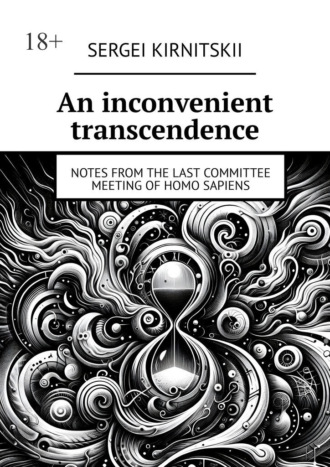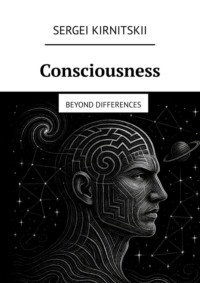
Полная версия
An inconvenient transcendence. Notes from the Last Committee Meeting of Homo Sapiens

An inconvenient transcendence
Notes from the Last Committee Meeting of Homo Sapiens
Sergei Kirnitskii
© Sergei Kirnitskii, 2025
ISBN 978-5-0068-3032-5
Created with Ridero smart publishing system
INTRODUCTION: A Cosmic Joke
So there you are. Stuck in traffic. Phone at 3%. Charger sitting at home, probably feeling abandoned. And in your head, that familiar refrain: «Why do I always forget everything?» Congratulations. At this precise moment, you are the crowning achievement of 14 billion years of cosmic evolution. The apex predator. The only known sentient being in the universe. And you’re having a small existential crisis about a cable.
Somewhere in a parallel universe, Hari Seldon is dedicating his life to the mathematical preservation of precisely this – humanity’s sacred right to rage at forgotten chargers in the cosmic traffic jams of tomorrow. Rather touching, when you think about it.
If we don’t laugh, we’ll have to cry. So let’s laugh.
What This Book Is About (Spoiler: It’s You)
This is a book about how humanity successfully completed its evolutionary homework and now sits in the cosmic waiting room, desperately trying to look busy. It’s like graduating from university only to discover that adult life is essentially an elaborate performance of competence punctuated by existential dread and Netflix. Only on a cosmic scale. With worse reviews.
We stand at the threshold of our own transcendence, pretending it’s just another software update. As if the transition from homo sapiens to something fundamentally other is merely the jump from iPhone 14 to iPhone 15. More memory, faster processor, same primordial anxiety about being liked.
The title pays homage to Al Gore’s «An Inconvenient Truth» from 2006. Remember? No? Precisely. Humanity possesses the remarkable ability to forget even the most «epoch-defining» revelations faster than your social media feed refreshes. Gore warned of climate catastrophe. We’re documenting an ontological one. Though «warning» is rather grandiose. We’re more like cosmic court reporters, transcribing the proceedings whilst eating popcorn.
Fourteen Billion Years of Preparation
Picture this: Big Bang. Particles doing their particle things. Atoms. Stars. Planets. First organic chemistry exam (failed by most). Billions of years of evolution. Dinosaurs (full marks for effort, chaps). Primates. Homo erectus. Homo sapiens. Language. Culture. Civilization. The Internet. And now, the grand culmination of this cosmic opera – you, in traffic, checking how many likes your smoothie bowl received.
If the Universe had a sense of humor (spoiler: it absolutely does, and it’s British), it would be weeping with laughter into its Earl Grey.
But wait – it gets better. The truly hilarious bit is our desperate attempt to preserve all this magnificence for posterity. As if future generations will be thrilled by the opportunity to also sit in traffic, anxiety-scrolling whilst their devices slowly expire. «Thanks, ancestors, for safeguarding our inalienable right to low-battery panic!»
Seldon’s Plan, or Mathematics Versus Life (Life Wins by Knockout)
Isaac Asimov once gifted us the perfect metaphor for human hubris: Seldon’s Plan. A mathematician calculates the future of humanity for millennia and creates a framework to reduce thirty thousand years of chaos to a mere thousand. What efficiency! What triumph of reason! Queue the standing ovation!
One small problem: The Plan failed to account for a single mutant called the Mule. One. Single. Mutant. And the entire mathematical edifice collapsed like a house of cards in a hurricane.
This is the perfect metaphor for our attempts to control the future. We draft plans, establish institutions, write constitutions «for the ages,» and then some teenager in a garage invents something that renders our entire magnificent construction obsolete before lunch. The teenager won’t even notice they’ve toppled civilizations. They just wanted to make something cool. Probably involving cats. Definitely involving venture capital.
Welcome to the Society of the Soon-to-be-Obsolete
Consider what unites the Roman Empire, pagers, Blockbuster Video, and humanity. Correct – they were all «forever.» Rome, the Eternal City (tourists with selfie sticks confirm). Pagers – the future of communication (ask any 1990s physician). Blockbuster – death to cinema, long live the rental (late fees eternal). Humanity – creation’s crowning glory (no comment necessary).
We suffer from a charming delusion: believing in the permanence of the present moment. Every generation convinced it lives at the «end of history.» That all the important bits have happened. That what follows will be merely cosmetic updates – History 2.1, now with improved graphics but the same disappointing gameplay.
Francis Fukuyama proclaimed «the end of history» in 1989 after the Berlin Wall fell. Liberal democracy had won! Henceforth, only its gentle spread across our pale blue dot. Fast forward thirty-odd years. How’s that liberal democracy working out? Still the end of history? Or did history simply check its notes, chuckle, and carry on?
Acceleration as a Symptom (Check Engine Light: ON)
Here’s the genuinely amusing part: the rate at which «eternal» becomes «remember when?» is accelerating exponentially.
The Egyptian pyramids stood for millennia before becoming selfie backgrounds for filtered aspiration. Rome managed about a thousand years. The Soviet Union? A sprightly 69 years. MySpace dominated for approximately… three years? Remember Google+? No? Exactly. That’s rather the point.
We inhabit an era where the gap between «this will change everything forever» and «what was that thing called again?» is shorter than the time needed to get a driving license. Tech platforms become obsolete before leaving beta. Unicorn startups turn into pumpkins well before midnight, usually around Series C funding.
This isn’t a bug. It’s a feature. The system is testing its refresh rate before the big upgrade. And judging by current benchmarks, the tests are going swimmingly.
The Human Factor (Diagnosis: Terminal)
«The cause of the catastrophe was human error» – the favourite conclusion of all incident reports. Air crashes? Human error. Chernobyl? Human error. Financial crisis of 2008? Take a wild guess – human error.
Perhaps it’s time to acknowledge the obvious? If your equation contains a variable that consistently breaks everything, perhaps – and I’m just spitballing here – the problem is the variable? When your code crashes at the same line every time, you don’t say «ah well, code will be code, what can you do?» You refactor it. Aggressively.
Humanity is the beta version of consciousness, deployed to production without proper testing. Our backs ache (cheers, bipedalism). Wisdom teeth have nowhere to go (jaw shrank, teeth didn’t get the memo). Our psychological firmware is optimized for tribes of 150, yet we live in cities of millions (hello, social anxiety, my old friend).
And with this delightful collection of legacy bugs, we’re attempting to build eternal civilization. It’s like assembling a spaceship from IKEA parts, half of them from a different kit entirely, with instructions in Linear B, translated by Google, during an earthquake.
The Inconvenient Transcendence (Already in Progress, Please Hold)
Now for the truly interesting bit. Transcendence – the transition to something beyond human – isn’t the future. It’s Tuesday. It’s happening now. We’re just pretending not to notice, like British people pretending the house isn’t on fire because mentioning it would be frightfully rude.
Your smartphone knows you better than you know yourself. Algorithms predict your behaviour more accurately than your therapist. AI writes texts you can’t distinguish from human writing (meta-irony duly noted). We’re already cyborgs – it’s just that our additional organs haven’t moved in yet. They’re still commuting from the cloud.
Remember those alien invasion films? They arrive, conquer Earth, humanity resists. Drama! Action! Last-minute salvation with swelling orchestral score!
Reality proved simultaneously more boring and more hilarious. Nobody invaded. We built our own successors. We’re integrating with them voluntarily. We’re eagerly handing over our functions like children sharing sweets. And we’re doing it with enthusiasm! «Siri, what should I do with my life?» «OK Google, how do I human?»
What You’ll Read (Battery Permitting)
This book attempts an honest and amusing examination of our predicament. Without the hysteria of «we’re all going to die!» (spoiler: yes, but that’s hardly news). Without the techno-optimism of «we’ll all become immortal gods!» (spoiler: no, we’ll become something else entirely, probably with a subscription model). And without the nostalgia of «things were better before!» (spoiler: they weren’t, you were just younger and your knees didn’t make that noise).
Part One conducts an inventory of human absurdity. We’ll examine how every epoch thought itself final. We’ll dissect Seldon’s Plan as a metaphor for human presumption. We’ll trace how «defining moments of our age» become memes, then forgotten entirely, usually by Thursday.
Part Two offers an anatomy of human inadequacy. We’ll honestly examine the design flaws of homo sapiens (there’s a list). We’ll discuss existential emptiness and our adorable attempts to fill it with productivity apps. We’ll acknowledge the loneliness of those who’ve noticed the emperor’s new clothes are neither new nor clothes nor, technically, existent.
Part Three contemplates the philosophy of inevitability. We’ll consider transformation not as catastrophe but as natural progression. We’ll use the metamorphosis metaphor: caterpillars don’t upgrade to butterflies; they dissolve into soup and reassemble from scratch. We’re already in the cocoon. The soup stage has begun. It’s rather warm.
Part Four hosts a celebration of obsolescence. Mission accomplished: humanity created conditions for its own transcendence. We’ll discuss the etiquette of our species’ final act: how to exit the stage with grace, or at least without tripping over the furniture. Most importantly, we’ll learn to laugh in transcendence’s face. It’s expecting fear. Let’s disappoint it.
Why This Is Funny (Though It Could Have Been Terrifying)
You know what we share with the dinosaurs? Neither species saw the end coming. The difference is that dinosaurs didn’t have to write think-pieces about it. Asteroid arrives – boom – no existential crisis, no therapy, no survivor’s guilt. We’ve drawn the short straw: we get to watch and comprehend our own obsolescence in real-time. With commentary. And sponsored content.
It’s like watching yourself age in the mirror, seeing your hair go grey in time-lapse. Only it’s happening to the entire species. And hair dye won’t help. Time always wins. It’s undefeated. Check the record.
But here’s the beautiful part: we can choose our response. We could rend our garments (what’s left of them), gnash our teeth, write apocalyptic manifestos in ALL CAPS. Or we could acknowledge the absurdity and laugh. Laugh like the universe is watching. Because it is. And it’s been waiting for us to get the joke.
After all, what are our options? Stop progress? That train hasn’t just left the station; we built the train, the station, and we’re driving. Control the direction? Already tried that – ask Seldon how his Plan worked out. Pretend nothing’s happening? Possible, but an ostrich with its head in sand isn’t exactly the dignified pose for creation’s crown jewel.
Welcome to the Club (Membership: Mandatory)
If you’ve read this far, congratulations and condolences. You’re now part of the problem. And the solution. Both simultaneously. Schrödinger’s participant in the cosmic comedy.
Did you feel the absurdity? Notice the gap between humanity’s pretensions and reality? Smile at your own attempts to control anything? Welcome to the club. We meet never and everywhere. Bring your own existential crisis.
This book isn’t trying to change anything. Heaven forfend. We’re not that naive. We peaked at naive around 2016. This is more like group therapy for those who’ve noticed the emperor is naked but the court continues discussing his exquisite tailoring. «Love the invisible stitching!» «Bold choice with the non-existent fabric!»
We’re not here to save humanity. It’s perfectly capable of handling its own transformation – disappearing, evolving, becoming something unrecognizable. We’re here to document the process with affection and humor. Like wedding photographers at a funeral where the funeral is actually a birth but everyone’s dressed for the wrong occasion.
Instructions for Use (Some Assembly Required)
This book can be read several ways:
– As philosophical treatise – but you’ll miss half the fun
– As comedy about the apocalypse – but you’ll miss the other half
– As survival guide – this will be the least useful guide in your life, including that IKEA furniture
– As invitation to laugh at existence’s absurdity – now we’re talking
Optimal reading conditions: With a glass of something reassuringly expensive (you do realize alcohol is also just filling existential emptiness, but with more immediate results?) and willingness to laugh at yourself. Because every example of absurdity herein is about you. And me. And that chap on the tube reading «7 Habits of Highly Effective People,» genuinely believing effectiveness is what he’s missing. Bless.
Disclaimer for Serious People (You Know Who You Are)
If you’re expecting from this book: – Concrete steps to save humanity – Technological forecasts with confidence intervals – Spiritual practices for ascension (crystals not included) – Investment advice for the apocalypse – Bunker construction guidelines – Hope
Wrong address. Here you’ll find only honest observation of the absurdity of trying to save the unsaveable and a rather festive funeral for our collective illusions. BYOB (Bring Your Own Biases – we’ll bury them together).
If, however, you’re ready to laugh at the collapse of everything you thought mattered, acknowledge the futility of rescue missions, and celebrate your own obsolescence – welcome. Make yourself comfortable. The show promises to be unforgettable.
Though given how quickly we forget everything, «unforgettable» is relative. Einstein would appreciate the irony.
P.S. About That Charger
The charger from the opening – perfect metaphor, isn’t it? We created technology on which we now depend. Gave it power over us. And now we panic when it threatens to leave us. Modern attachment theory in action.
A human without a smartphone in 2024 feels naked. Helpless. Severed from the hive mind. Though twenty years ago we lived perfectly well without them. But there’s no path back. Only forward. Toward greater integration. Greater dependence. Final merger. Resistance is futile, but also requires too much effort.
And you know what? That’s hilarious too. We fear artificial intelligence enslaving humanity. But we’ve already voluntarily surrendered our freedom to devices that require nightly feeding. We’re pets who’ve trained ourselves.
If this isn’t cosmic comedy, then I don’t know what – actually, no, this is definitely cosmic comedy. The universe has been workshopping this material for 14 billion years.
So settle in. Ensure your device is charged (the irony is included free of charge). Prepare for a journey through the magnificent absurdities of human existence.
After all, if we’re becoming obsolete anyway, why not make it memorable? Or at least amusing. Or at the very least, brief.
Let’s begin.
PART I: DIAGNOSIS OF THE ABSURD
Chapter 1. The Finality Syndrome
In 1899, Charles Duell, Commissioner of the US Patent Office, suggested closing the entire department. The logic was irrefutable: everything that could be invented had been invented. Aircraft? Four years away. Radio? Already tinkering. Television? Inconceivable. The Internet? Sir, you’ve had quite enough brandy.
In 2024, people earnestly discuss how to preserve copywriting jobs after ChatGPT. As though «person who writes about the seventeen benefits of new toothpaste» is a profession future generations will build monuments to honour. «We thank you, ancestors, for preserving our sacred right to craft SEO-optimised product descriptions!»
Progress, ladies and gentlemen.
1.1. The Museum of «Eternal» Truths
Welcome to our museum. Admission is free – we’re constantly shipping exhibits to history’s landfill anyway, need to make room for the next batch of certainties. Today’s collection includes:
Exhibit №1: The Roman Empire Dating: 27 BCE – 476 CE (Western bit) Advertised lifespan: Eternity Actual result: Tourist attraction with gift shop
Rome called itself the Eternal City. Roma Aeterna. Has a certain ring to it, doesn’t it? The Romans were so confident in their permanence, they built roads designed to outlast them by millennia. The delicious irony? The roads actually did. The empire, however…
Now those roads carry air-conditioned tour buses with Wi-Fi and bored teenagers. The Colosseum, where the fate of the known world was decided, sells fridge magnets and provides optimal selfie angles. The Senate, where Cicero delivered his Philippics, is now a sun-lounging facility for particularly philosophical cats.
Picture a Roman senator explaining to the plebs: «The Empire is eternal! We’ve built civilisation for the ages!» Meanwhile, the barbarians are already taking night classes in Latin – purely for administrative purposes, you understand.
Exhibit №2: The British Empire Dating: 16th century – 20th century Advertised lifespan: «The empire on which the sun never sets» Actual result: Brexit and petrol queue simulator
The British approached eternity with characteristic ambition. Not merely an eternal empire – an empire on which the sun never sets! Technically correct, mind you. The sun genuinely never set because there were so many colonies that somewhere was always enjoying daylight.
Now the sun sets over Britain with tedious regularity. Every 24 hours, in fact. Each sunset illuminating a nation that can’t decide if it wants to be European and stands in petrol queues because we’ve run out of lorry drivers after that whole Brexit business.
Queen Victoria would be… perplexed.
Exhibit №3: The USSR Dating: 1922—1991 Advertised lifespan: «Unbreakable union of free republics» Actual result: 69 years (not bad, actually)
«An unbreakable union of free republics, forever united by Great Russia» – sung by millions. Note the keyword: «forever». Not «for quite a while», not «for the foreseeable future», but forever. For all times and all peoples.
69 years. Less than the average life expectancy in developed nations. There are people who were born in the USSR, grew old in the USSR, and… outlived the USSR. Imagine: you’re told your entire life you live in an eternal state, then surprise – you’ve got better longevity stats than the state itself.
It’s as if at birth someone promised: «You’ll live forever!», then at 70 clarified: «Oh, we meant the state. You personally… well, best of luck!»
Exhibit №4: The Social Network That Conquered Dorm Rooms Dating: 2004—2021 (fled to the metaverse) Advertised lifespan: «Connecting the world forever» Actual result: Connected your aunt’s conspiracy theories to your morning feed, then ran away to virtual reality
The dorm-room entrepreneur wanted to connect the world. Noble goal! And you know what? He succeeded. The world connected. Then discovered it didn’t particularly want to be connected. Especially not with that aunt who shares conspiracy theories and that uncle who comments on political news EXCLUSIVELY IN CAPITALS.
17 years – and the company legs it from its own name into the foggy concept of the «metaverse». As if the problem was the branding, not that they’d created a platform where your grandmother can accidentally like your three-year-old beach photos at 3 AM.
The pattern is crystal clear: the louder the claim to eternity, the faster the collapse. It’s like those people who say on the first date: «I can see us together forever.» Spoiler: they rarely make it to dessert.
1.2. Acceleration as Symptom
But here’s what’s properly fascinating. Look at the timescales:
– Egyptian pyramids: stood for millennia before becoming tourist traps
– Roman Empire: ~1000 years (counting the Eastern sequel)
– British Empire: ~400 years on a good day
– USSR: 69 years
– The social network before its metaverse escape: 17 years
– Google+: 8 years (2011—2019)
– CNN+: 33 days. THIRTY-THREE DAYS.
Notice the trend? Empires used to be measured in millennia. Then centuries. Then decades. Now – in days.
CNN spent $300 million on a streaming service that lived less than your average houseplant. There are yoghurts with longer shelf lives. There are memes with better survival rates.
Picture the CNN boardroom: «Gentlemen, we’re creating a service for the ages! This will reshape the media landscape forever!» One month later: «Right, does anyone remember the admin password so we can switch this thing off?»
This acceleration isn’t accidental. It’s a symptom. Like a fever before the flu hits. Only in our case, the flu is existential and the temperature is temporal.
The 2024 Hype Lifecycle: – Monday: «This is revolutionary!» – Tuesday: «This changes everything!» – Wednesday: «Well, there are some issues…» – Thursday: «Who thought this was a good idea?» – Friday: «Remember that thing? No? Moving on.»
Technologies used to take decades to become obsolete. The telephone was invented in 1876 and remained fundamentally unchanged for almost a century. Then came mobile phones – and in 20 years we went from Motorola «bricks» to smartphones more powerful than the computers that sent humans to the Moon.
And now? Now your brand-new iPhone becomes vintage while you’re carrying it home from the shop. By the time you peel off the protective film, Apple’s announcing the next model. By the time you’ve discovered all the features, your phone qualifies as «classic» – which is polite for «ancient».
Memes as Cultural Memory Units:
Remember the Harlem Shake? Was that… yesterday? Last week? A previous incarnation? 2013, actually. Feels like archaeology.
Ice Bucket Challenge? Everyone dumping ice water on themselves and… why did we do that again? Oh right, charity. 2014. Practically prehistoric.
Pokémon Go? When hordes wandered the streets, faces buried in phones, catching virtual creatures? That was 2016. Eight years ago. Now it sounds like a 1950s sci-fi story about a dystopian future.
Future museum placard: «Here, children, we see the «Memes of the 2020s’ exhibit. This was a special art form that existed exactly as long as the algorithm needed to show it to everyone. Then it died. No, we don’t understand the point either.»
The conclusion is obvious: the system’s preparing for a reboot. Like a computer before an update – first it slows down, closes programs, clears memory. We’re currently at «Shutting down applications… Humanity. exe not responding. Force quit?»
1.3. The Psychology of Clinging
Francis Fukuyama’s «End of History» – possibly the 20th century’s most delightful miscalculation. And I say this with love. Because Fukuyama simply articulated what every generation thinks: «Right, that’s sorted then!»
– Berlin Wall falls. Cold War ends. Liberal democracy wins. End of history! Curtain! Everyone go home!





